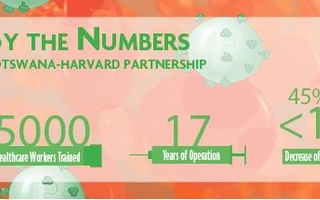At an orphanage in Botswana, a 14-year-old girl lost her mother to AIDS last year, quietly resigning herself to what must have been a catastrophic blow in the life of a child.
Her mother was one of 11,000 to fall victim to HIV/AIDS in Botswana that year.
Facing the second highest HIV infection rate in the world, the Botswanan government has taken steps in recent years to increase access to antiretroviral drugs.
Of the roughly 350,000 living with HIV/AIDS—or one-third of the country’s adult population—56 percent received treatment in March 2005, according to the Kaiser Family Foundation.
Since the mid 1990s, Harvard faculty and students have flown out to two outposts in Botswana and Tanzania—the cornerstones of Harvard’s presence in Africa—to conduct ground-breaking HIV/AIDS research.
But earlier this year, Harvard’s two HIV/AIDS research centers in Africa each spun off limited liability companies, a strategic move that will open up funding streams that had previously been off-limits due to federal restrictions.
For the 120,000 AIDS orphans living in Botswana, the potential funding increase could speed further advances in research as well as public health initiatives.
When JJ Diah ’10 visited the SOS Children’s Villages orphanage last spring during her semester in Gaborone, she found that this young girl—whose name Diah does not remember—managed to keep an outlook on life defined more by hope than by despair.
“She didn’t expect her mother to die, but she knew that it was a possibility—it was that HIV/AIDS is a reality,” Diah says. “For them it’s like, we know which family members have HIV/AIDS, and we know people are going to die from this.”
A TOWERING FIGURE
The biography of Harvard School of Public Health professor Myron “Max” Essex reads much like the history of HIV/AIDS research.
Essex was one of the first to link retroviruses to AIDS, to discover that HIV could be transmitted through bodily fluids, and to identify the protein now used world-wide to screen for the disease.
Despite Essex’s protests (“I don’t like to use the word ‘breakthrough,’” he says), the founder of Harvard’s facility in Botswana has overseen multiple major advances in the field, saving countless lives in the process.
With the creation of limited liability companies, the research centers—which had been funded primarily through grants from the National Institutes of Health—will gain access to grants from European entities as well, says Jorge I. Dominguez, the University’s vice provost for international affairs.
It remains unclear how much funding the African centers will receive, but Wafaie Fawzi, who directs the program in Tanzania, says he expects an increase in funds available for research.
Read more in News
Ellison Takes Winding Path to CollegeRecommended Articles
-
Drew Goes on SafariThis November, President Drew G. Faust will be traveling to South Africa and Botswana. To help our girl out, FM ...
-
 AIDS Leads to Stigma on Campus
AIDS Leads to Stigma on Campus -
HSPH Awarded HIV Prevention GrantThe Centers for Disease Control and Prevention have awarded a four-year $20 million grant to researchers at the School of Public Health to study HIV prevention in Botswana as part of a President’s Emergency Plan for AIDS Relief (PEPFAR) initiative.
-
 Harvard Partnership Fights HIV/AIDS in Botswana
Harvard Partnership Fights HIV/AIDS in Botswana -
 One World, One Dream
One World, One Dream -
Shorenstein Center Names Four Spring FellowsThe fellows will spend the semester researching and writing a paper on a topic of their choice.













